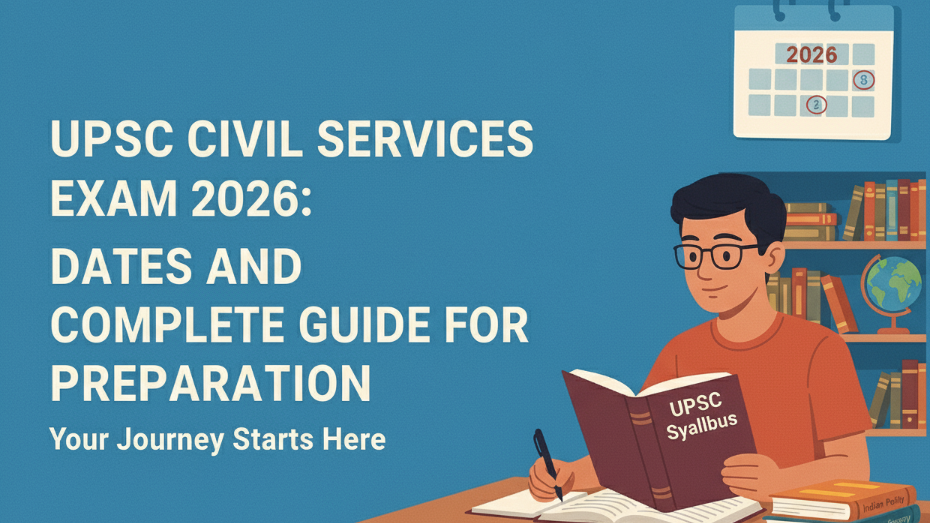Various candidates are selected through UPSC Civil Services Exam for various services. IAS, IPS, and IFS are some of the services for which the candidates are selected. Through this blog you will know how to prepare and crack the UPSC Civil Services Exam in 2026.
In this blog you will explore upsc syllabus, upsc exam pattern, prelims and mains syllabus, preparation guide, and tips on cracking the exam.
What is UPSC?
UPSC full form: Union Public Service Commission
UPSC CSE full form: Union Public Service Commission Civil Services Exam
UPSC recruits people for various government exams. Civil Services Exam, IAS, CMS, CDS, NDA, etc are included in UPSC
UPSC 2026 exam dates
| Event | Date |
|---|---|
| UPSC Notification Release | 14 January, 2026 |
| UPSC Form Fill Up | 14 January, 2026 |
| UPSC Form Last Date and UPSC Last Date | 3 February, 2026 |
| UPSC Prelims Date | 24 May, 2026 |
| CSE Exam (Mains) Start Date | 21 August, 2026 |
| Mains Duration | 5 Days |
Keep checking the UPSC official website for more updates
UPSC Exam Eligibility
To apply for UPSC CSE Exam, the candidates must be eligible for certain requirements which are as follows:
1. Nationality: Must be an Indian
2. UPSC Exam Qualification: A bachelor’s degree from any recognized university is mandatory. Final-year students can also apply for the IAS application process.
3. UPSC Exam Age Limit:
| Category | Minimum Age | Maximum Age | Attempts |
|---|---|---|---|
| General | 21 years | 32 years | 6 |
| OBC | 21 years | 35 years | 9 |
| SC/ST | 21 years | 37 years | Unlimited (till UPSC age limit) |
UPSC Exam Pattern
3 stages in the UPSC Civil Services:
| Stages | Paper Name | Marks |
|---|---|---|
| Preliminary | General Studies Paper 1 CSE Aptitude Test Paper 2 | 200 200 |
| Mains | Essay General Studies Paper 1-4 Optional Subject 1& 2 Language | 250 1000 500 300 |
| Interview | – | 275 |
UPSC CSE Syllabus
UPSC Prelims syllabus:
| Paper | Syllabus |
|---|---|
| General Studies Paper I | History, Geography, Politics, Economy, Environment, Science & Technology |
| CSAT Paper II | Comprehension, Logical Reasoning, Analytical Ability, Decision Making, General Mental Ability |
UPSC Mains Syllabus:
| Paper | Topics Covered |
|---|---|
| Essay Paper | Essays on multiple topics |
| General Studies Paper I | Indian Heritage and Culture, History and Geography of the World and Society |
| General Studies Paper II | Governance, Constitution, Politics, Social Justice and International relations |
| General Studies Paper III | Technology, Economic Development, Bio-diversity, Environment, Security and Disaster Management |
| General Studies Paper IV | Ethics, Integrity and Aptitude |
| Optional Subject Papers I & II | Subject chosen by the candidate |
UPSC Form Fill Up Process
If you are wondering about ‘how can i apply for upsc exam’ then following are the steps that you can follow:
1.Visit the official UPSC website.
2.Click on ‘Apply Online’.
3.Complete Part-1 registration form.
4.Proceed to fill Part 2 registration form and pay fees.
5.Verify everything before submitting
6.Download and print confirmation page for reference.
Vacancy Form: Expected around 1100+ vacancies (final number will be released after notification)
How to Start UPSC preparation after 12th
Starting UPSC CSE preparation after 12th can be an important decision. Here is how you can start:
1.Know about the UPSC exam pattern and syllabus.
2.Select an optional subject that you like.
3.Use NCERT books for subjects like Geography, History and Politics.
4.Know about current affairs and general knowledge.
5.Solve previous year’s UPSC question papers to understand the pattern and prepare accordingly.
6.Create a Timetable that you can follow consistently
7.If you want, then you can also join a reputable coaching institution.
Books for reference
| Subject | Reference Books |
|---|---|
| History | NCERT Books (Class 6-12), "India's Struggle for Independence" by Bipan Chandra |
| Geography | NCERT Books (Class 6-12), "Certificate Physical and Human Geography" by G.C. Leong |
| Polity | "Indian Polity" by M. Laxmikanth |
| Economy | "Indian Economy" by Ramesh Singh |
| Environment & Ecology | NCERT Books, "Environment and Ecology" by Majid Husain |
| Ethics | "Lexicon for Ethics, Integrity & Aptitude" by Niraj Kumar |
Strategy to crack UPSC CSE
1.Start early to prepare everything properly.
2.Consistently practice daily.
3.To remember everything well, revise once a week.
4.Take mock tests regularly. This will improve your practice and time management skills
5.Have a balanced diet and regular exercises. This keeps your mind and body fresh.
UPSC Prelims v/c Mains
| Feature | Prelims | Mains |
|---|---|---|
| Type | Objective (MCQ) | Descriptive |
| Marks | 400 (200 each for GS Paper I & CSAT) | 1750 (Essay, GS I-IV, Optional) |
| Purpose | Screening Test | Final Selection |
| Duration | 1 Day | 5 Days |
| Negative Marking | Yes (1/3rd of the marks assigned) | No |
FAQ’s
1. What is the age limit for UPSC CSE?
Ans: The age limit for general category candidates is 21 to 32 years.
2. Can I appear for UPSC after completing my graduation?
Ans: Yes you can appear after your graduation from a recognised university.
3. Is there any limit on the number of attempts?
Ans: Yes. For general category it is 6 attempts, for OBC it is 9, and for ST/SC it is unlimited attempts until the age limit is reached.
4. How can I stay updated with UPSC notifications?
Ans: You can visit the official website.
5. Is coaching necessary for cracking UPSC CSE?
Ans: It is not mandatory. It depends upon you.

